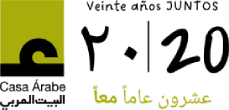Exhibitions
Index / Activities / Exhibitions / Tunisian Enlightenments
Tunisian Enlightenments
From May 07, 2025 until July 27, 2025Every Monday through Sunday, from 10:00 a.m. to 8:00 p.m.
MADRID
Casa Árabe exhibition halls (at Calle Alcalá, 62).
Every Monday through Sunday, from 10:00 a.m. to 8:00 p.m.
Free entry until the event’s capacity is reached.
In Spanish.
As of May 7, Casa Arabe is presenting a very carefully made selection of Tunisian modern art, with the cooperation of the Museum of Modern and Contemporary Art, Tunisia’s Ministry of Cultural Affairs and the Tunisian Embassy in Spain. The exhibition forms part of Casa Árabe’s Tunisia Country Focus in 2025.
Modern art in Tunisia emerged at the beginning of the twentieth century, influenced by European movements, but with its own identity that would combine Arab and Islamic roots with Mediterranean modernity. During the colonization by France, Tunisian artists began to explore other forms of expression, incorporating new techniques and reinterpreting local themes. After gaining independence in 1956, Tunisian art grew stronger and took on a powerful national identity, which gradually embraced both painting and sculpture. Within this context, key figures like Zoubeir Turki and Ammar Farhat emerged and helped to define the country’s contemporary style. Safia Farhat, a pioneer in the visual arts and founder of Faïza, the first Arab-African feminist magazine, also stood out. As part of this artistic development, the School of Tunis took root as one of the most influential movements. Founded in the 1940s, this current promoted a pictorial vision that combined traditional Tunisian aesthetics with the creative freedom found in modern art, while also seeking to distance itself from Orientalism. Inspired by light, colors and everyday scenes in the country, the artists in this school, including Yahia Turki and Jellal Ben Abdallah, rejected European academicism and sought a more authentic and local form of expression, breaking away from the colonial imaginary. Although one cannot truly speak of any homogeneity to define a particular style for the School of Tunis, which combines both naturalism and abstraction, it can be said to have played a crucial role in the reaffirmation of Tunisia’s artistic identity and in the projection of national art on the world stage.
Getting the chance in Madrid to see these Tunisian Enlightenments, a selection of representative works from such an important era within the twentieth century, is the result of Casa Árabe’s close collaboration with the Museum of Modern and Contemporary Art and the Tunisian Ministry of Cultural Affairs, all facilitated by the Tunisian Embassy in Spain. The exhibition also forms part of the activities in the Tunisia Country Focus of 2025.
Getting the chance in Madrid to see these Tunisian Enlightenments, a selection of representative works from such an important era within the twentieth century, is the result of Casa Árabe’s close collaboration with the Museum of Modern and Contemporary Art and the Tunisian Ministry of Cultural Affairs, all facilitated by the Tunisian Embassy in Spain. The exhibition also forms part of the activities in the Tunisia Country Focus of 2025.
The exhibition can be seen in Madrid until July 27.


